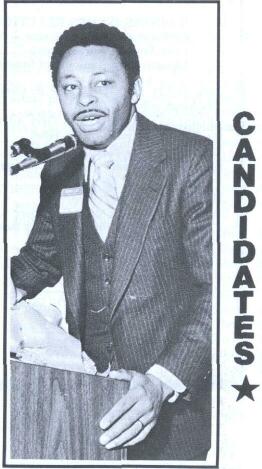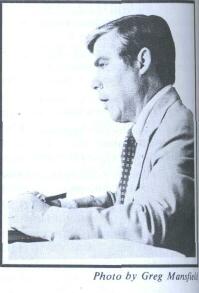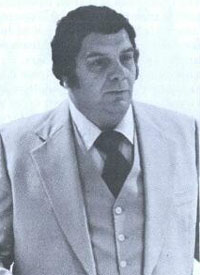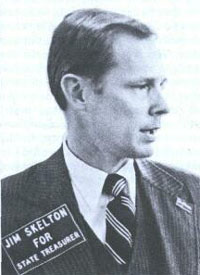By SHARON MAHER Burns v. Castle, Cosentino v. Skelton Comptroller, treasurer races — too close to call WITH ALL the statewide executive offices up for election for the first time since the 1970 Constitution took effect, the comptroller and treasurer races will probably receive the least amount of attention in this non-presidential year. Ironically, these offices generated the only real contests in the primaries. The comptroller candidates in the November general election are Democrat Roland Burris and Republican John W. Castle. Running for treasurer are Democrat Jerome A. Cosentino and Republican James M. Skelton. Comptroller primaries The primary elections for comptroller and treasurer were largely a fight between upstate and downstate — between the party-endorsed and the party independents. In the Republican race for comptroller, Castle, then director of the Department of Local Government Affairs, defeated W. Robert Blair, former speaker of the House, with 52 per cent of the vote. Throughout the campaign Blair criticized Gov. James R. Thompson's endorsement of Castle and charged that Castle would not run the comptroller's office independently of the governor. Castle had originally announced for treasurer but switched to comptroller at the urging of Thompson. Castle denied that political ties would influence any decisions he might make if elected comptroller. On the Democratic side, Burris, a Chicago attorney and director of the Department of General Services under Gov. Dan Walker, received 64 per cent of the votes, defeating Rep. Richard Luft. Luft had campaigned for months before the slatemaking and had been the early choice for the Democratic nomination. He was edged out at the last minute by Burris. It was reported that Burris had been slated because of pressure by black Democrats in Chicago to put a black on the ticket. Burris says race has nothing to do with his campaign, that he is running because he is
SHARON MAHER
4/August 1978/Illinois Issues qualified for the job. Luft challenged Burris' qualifications, citing Burns' performance as the head of the Department of General Services. He maintained that the department was mismanaged under Burris. Burris insists that he did a good job and that the record proves it. Treasurer primaries In the Democratic race for treasurer the slatemaking process was also a major issue, as the slated candidate, Cosentino, a Metropolitan Sanitary District commissioner, defeated Nina T. Shepherd, a University of Illinois trustee, by taking 60 per cent of the vote. Shepherd, who had appeared unsuccessfully before the slatemakers, ran with the backing of the Independent Voters of Illinois. Her campaign was basically a response to the party's failure to slate a woman for any statewide office. Although there was little direct confrontation between Shepherd and Cosentino during the campaign, Cosentino had one nagging problem: his trucking firm was under investigation by the Interstate Commerce Commission because of possible violations of the Interstate Commerce Act. The investigation turned up no evidence of any wrongdoing, but it was not completed until after the primary. The recent sludgehauling scandal in the Metropolitan Sanitary District also reflected on Cosentino, even though he was not elected until three years after the Inland Barge contract was awarded and he had led the fight to force the contractor to return an overpayment to the district. The Republican nominees for treasurer had no scandals or slatemakers to cope with, so Skelton and Sen. Bradley Glass generally dealt with the problems of running the office. However, there was an underlying party conflict between upstate and downstate. Skelton's victory over Glass by a narrow 52 per cent of the vote was considered a step toward returning party control to downstate. Though the primary races for treasurer and comptroller offered the only real contests in the primary, the general election campaigns for the offices promise to be overlooked as attention is diverted to the big race between James Thompson and Michael J. Bakalis. Most of the issues raised in the primary races for comptroller and treasurer, however, are still being debated between candidates.
Burris v. Castle The comptroller candidates. Democrat Burris and Republican Castle, are debating the question of whether the adversary relationship that has existed between the governor and the comptroller would continue if both the governor and comptroller are of the same party. To date, the comptroller has not been of the same party as the governor. Republican George Lindberg was an adversary of Democratic Gov. Dan Walker, and Bakalis as comptroller has opposed Thompson. Burris has expressed doubts about Castle's ability to keep the offices of comptroller and governor separate if both Castle and Thompson are elected. Even though Burris was the party slatemaker's choice, he says that party loyalty will not affect him because Bakalis had neither endorsed nor encouraged him to run. Castle says he doesn't mind being known as the "governor's boy," but does resent the implication that he will not do his job. Castle says that he doesn't think party ties or links to other persons in state government will prevent either him or Burris from doing a good job as comptroller. Castle must feel some pressure to emphasize his independence, however, since he resigned at the end of May as director of the Department of Local Government Affairs. Burris and Castle agree on many of the functions of the comptroller. Both say that the practice of issuing a revenue statement separate from the governor should be continued. They say the practice has proved to be a necessary check on the governor and legislature since it provides one more way of keeping the public informed on state spending. Although generally satisfied with procedures of the comptroller's office, both Burris and Castle have suggested some changes. Burris would like to see elimination of double-budgeting and a change in the way funds are transferred among agencies. Double-budgeting is the practice of listing appropriations in several places in the budget. An example is the procedure followed in listing revolving funds. Amounts are listed as budget items for seven state agencies who use the revolving fund, but the total amount is also listed as a budget item for the Department of Administrative Services. Burris wants this clarified so that the public can understand what the budget means without a lengthy examination and explanation. Castle thinks that this is a decision for the legislature or the Bureau of the Budget, not the comptroller. Burris also proposes a simpler way to
August 1978/Illinois Issues/5 transfer money between agencies. He wants to replace the present procedure of paying another agency for a service, as if it were an outside vendor, with a simple book transfer. Castle said that this may not be possible because the method of handling the payment depends on the source of funds. Castle wants to improve the data processing system now used by the comptroller. He says computer tapes and printouts are currently brought by messenger to Springfield where they are processed. Castle contends that the comptroller has apparently not heard of high speed data lines or other modern computer technology. Caslte would also like to expand the pre-audit function of the comptroller to insure that expenditures are valid before they are made. Burris agrees this should be done. Further changes may be proposed by Castle during his campaign; he has a committee investigating how to bring the office more in line with the intent of the state Constitution. The committee members, all delegates to the Constitutional Convention, are Stanley Johnson of Malta, Albert Smith of Decatur and Jeannette Mullin of Chicago. The treasurer's race Although past campaigns for treasurer have attracted considerable attention, this one will probably be as neglected as the one for comptroller. In the past, the treasurer's office was regarded as a good political stepping-stone, but that was when the treasurer stood alone as the highest state official elected in a non-presidential election year. Former treasurers include Gov. William G. Stratton, Sen. Adlai E. Stevenson III, Atty. Gen. William J. Scott and Secy. of State Alan J. Dixon. The present candidates, Republican Skelton and Democrat Cosentino, do not admit to any great political ambitions. Both say they only want to be treasurer and both discount the "steppingstone" aspects of the office. The question of who should deposit the state's money in banks is not one that causes great excitement among voters, but it is the one real issue of the campaign. The present investment policy, in use for about 10 years, is the result of a four-year study completed by the Ford Foundation in 1968. The policy is based on the idea of "rewarding" banks for their community service in the form of loans. Under this plan money is deposited in each county, with the amount of money each bank receives determined by a system of bids and ranking. First the treasurer determines a minimum acceptable rate of interest. Banks are then invited to bid. The banks are weighted according to size, interest rate offered and the amount of outstanding loans. Major Chicago banks are not allowed to bid on long-term investments because it is felt they would receive too great a share of the funds. They are permitted to bid on short-term investments, however. The contention is that all communities in the state benefit from this sharing of the state's money because of increased amounts available for loans to business and private customers. But Skelton does not think this plan has been effective. He says that no follow-up study or audit has ever been done to prove that the plan works as intended. He has promised to do an audit if he is elected. Skelton has proposed an alternative plan for making investments. He would divide banks into groups by size and then allow the banks in each group to bid against each other for the funds. He is also appointing a committee to investigate additional methods of investment. Cosentino would not change the current investment policy because he believes it has proven to be a good way to promote economic growth. Cosentino would rather concentrate on strengthening the relations between the state and local treasurers. He plans to continue and expand the current program by which municipal and county funds may be deposited along with state funds so that local governments can earn maximum interest on their investments. He would also like to see legislation passed that would require all government units to deposit their money in interest-bearing accounts. An aide to Cosentino says that many government entities, such as school districts and townships, are losing revenue because funds are left in checking or other accounts that do not earn interest. It does appear that Castle is hoping Thompson has some "coattails" while Burris, on the other hand, made no effort to ally himself with Bakalis. The lack of any really dramatic issues makes predictions on the comptroller and treasurer races nearly impossible. 6/August 1978/Illinois Issues
|
||||||||||||||||||




